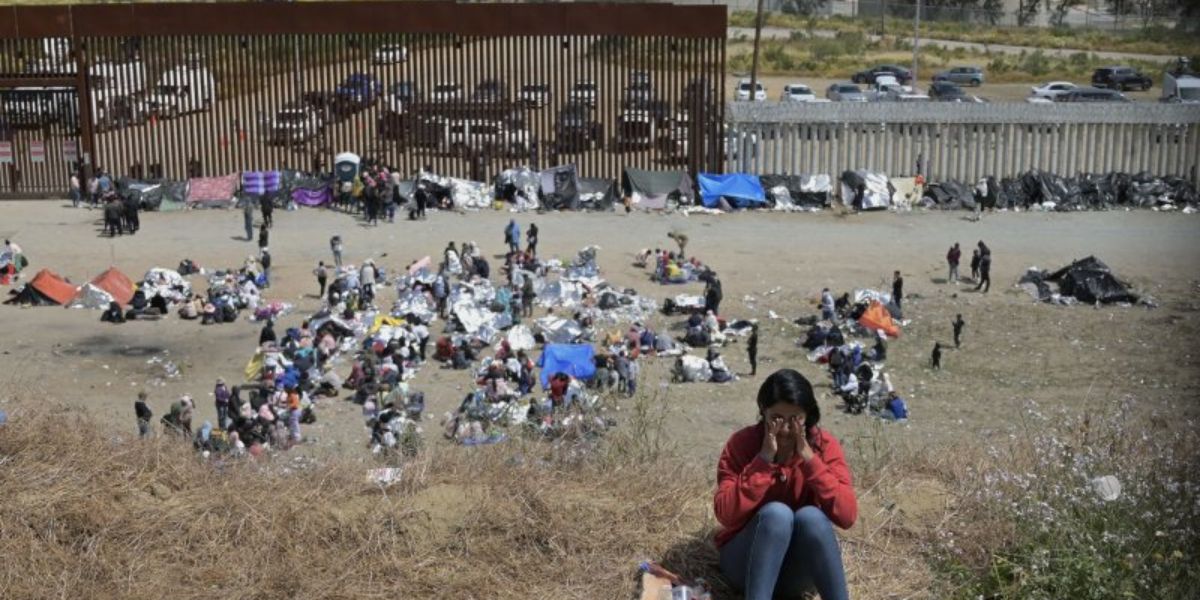Daniel Bermudez’s family had escaped Venezuela and was on their way to the United States to seek refuge when their freight train was stopped by immigration officials in Mexico.
His wife attempted to explain that her family had permission to travel to the United States. Instead, they flew her to Mexico’s southern border as part of a flurry of enforcement activities that, according to US officials, has contributed to a dramatic decline in illegal border crossings.
In addition to forcibly removing migrants off trains, Mexico has begun flying and busing them to the country’s south and has begun flying some back to Venezuela.
Even if it is only temporary, the reduction in illegal border crossings is great news for the White House. President Joe Biden’s administration is in talks with Senate negotiators over limiting asylum, and $110 billion in aid to Ukraine and Israel is at stake.
Bermudez stated that his wife was separated from her family after speaking with authorities as he grabbed his stepchild and their possessions. He wanted to flee, but his wife told him they couldn’t since they had followed protocol by booking an appointment with US immigration officials.
“‘Don’t trust them,’ I advised her. “Let’s go into the brush,” Bermudez added, adding that other migrants had fled as well. “Why are they sending us back if we have an appointment?” she had asked.
Bermudez, his stepchild, and two other relatives awaited her in a shelter in the Mexican border town of Piedras Negras last week as she rode a bus back in the hopes of making the date.

According to Witness at the Border, an advocacy group that analyzes flight data, Mexico’s immigration department deployed at least 22 flights from its border region with the United States to southern cities during the last ten days of December. The majority came from Piedras Negras, which is located over the border near Eagle Pass, Texas.
Mexico also operated two removal flights to Venezuela, each carrying 329 migrants. The stretch was highlighted by US Secretary of State Antony Blinken’s visit to Mexico City on December 28 to tackle increased border crossings to the US.
Mexican President Andrés Manuel López Obrador announced the resolution of a funding gap that had forced the immigration service to postpone deportations and other operations. He did not provide any specifics.
According to US authorities, the number of arrests for illegal border crossings from Mexico fell to around 2,500 on Monday, down from more than 10,000 on several days in December. According to Tucson, Arizona, sector head John Modlin, arrests reached 13,800 during the seven-day period ending Friday, down 29% from 19,400 two weeks earlier.
After a month-long restriction on the most direct route from Phoenix to its nearest beaches, US Customs and Border Protection reopened the port of entry in Lukeville, Arizona, on Thursday. The United States also reopened operations in Eagle Pass and three other locations.
Merchants in Eagle Pass, a population of roughly 30,000 people, reported a “significant drop” in sales while a bridge was stopped to vehicle traffic so border officials could be reassigned to help process migrants, according to Maverick County Judge Ramsey English Cantu.

“We survive pretty much from everything that comes from the Mexican side,” he went on to say.
After a five-day stoppage in response to as many as 1,000 migrants riding atop a single train through Mexico before attempting to cross the border, CBP resumed freight crossings in Eagle Pass and El Paso, Texas, last month.
On Thursday, Casa del Migrante in Piedras Negras accommodated roughly 200 migrants, down from 1,500 lately.
Manuel Rodriguez, 40, said his family will miss their appointment to request asylum scheduled through the US government’s CBP One app. He stated that the appointment was made with his in-laws, who were deported to Venezuela after officials boarded the bus on which they were traveling.
“It was all under her name, and she lost everything,” Rodriguez explains.
Proposals under consideration by White House and Senate negotiators include a new expulsion authority that would deny asylum claims if unlawful border crossings reached a particular level. Any such authority would almost definitely be contingent on Mexico’s willingness to return non-Mexicans who enter the United States illegally, which it already does on a limited scale.
Mexico’s support was vital to the defunct Trump-era regulations that made 70,000 asylum-seekers to wait in Mexico for hearings in US immigration court and denied asylum rights during the COVID-19 outbreak.
The president of the Migration Policy Institute in Washington, D.C., Andrew Selee, cautioned against exaggerating Mexico’s participation in the current decline in traffic. Less than 25,000 migrants passed through the Darién jungle in December, roughly half the number seen in October, indicating that fewer individuals are departing South America for the United States. During the holidays and winter weather, migration often decreases in December.
“The U.S. is able to lean on Mexico for a short-term enforcement effect on migration at the border, but the long-term effects are not always clear,” he said.
